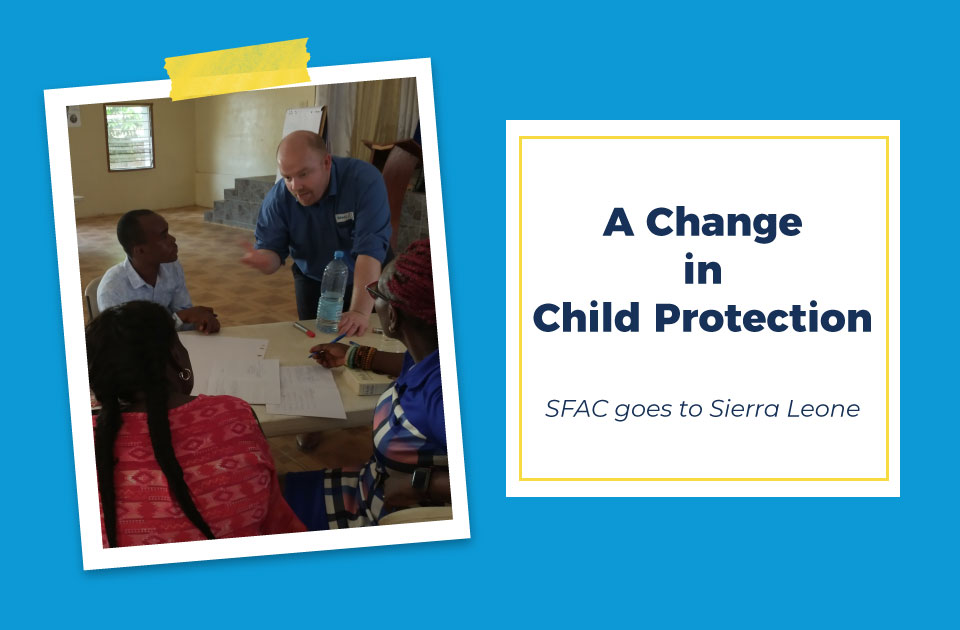This blog post was written by SFAC volunteer, Josh Gregory.
On April 1st this year, our CEO Dan Hope made the long trip to Sierra Leone, providing SFAC’s first in-person training since the beginning of the COVID-19 pandemic.
Where: Sierra Leone
Sierra Leone is a small country on the West Coast of Africa. Dan reported how the country has stunning beaches and some very good local music including one band that played non-stop for 45 minutes in 45°C heat (there was time for a cultural visit to the local bars but not the beach!).
One of the poorest countries in the world, Sierra Leone was exploited in the past by European countries and was a key geographical location for slave trading. Since its independence 60 years ago, Sierra Leone and its neighbouring countries have experienced civil war, health disasters, such as Ebola, and a lack of investment.
Why: Child Protection in Sierra Leone
An estimated 310,000 children in Sierra Leone grow up without parental care and 76,000 children live on the streets. High numbers particularly when compared to an overall population of 8 million people (50% are estimated to be under the age of 16). As in so many countries, a major response to a lack of parental care and children living on the streets has been orphanages and children’s homes, mainly run by NGOs (non-governmental organisations and charities).
Who: Child Reintegration Centre & Helping Children Worldwide
Dan’s work was with one such NGO: a Christian organisation called Child Reintegration Centre (CRC). Sierra Leone is predominately Islamic but has a significant Christian population. Staff at CRC were from both faiths and their work is not faith specific. In fact, Dan was particularly struck by the harmony and respect displayed between individuals of differing faiths. He appreciated how CRC ensured the inclusion of Islamic faith practices in their community outreach.
CRC’s funding comes from a USA based organisation called HCW (Helping Children Worldwide) who is a partner organisation of another USA based organisation called 1MillionHome. 1MillionHome and SFAC have a partnership where SFAC provides training to practitioners on good practice.
When working with programs such as the CRC, SFAC lives by a certain motto:
“There is often a base of people who have good intentions, but don’t necessarily know best practice in child care and protection because they haven’t had access to training; and a lot of SFAC’s work is about turning those good intentions into good practice”.
This motto is particularly pertinent when addressing the work CRC do. CRC previously operated a 40-60 bed children’s home in Bo. That all changed, however, when Nabs, the then director of the children’s home and a former resident of the same institution, concluded that caring for children in a children’s home or orphanage was not the most effective, safe, or healthy solution to the problem Sierra Leone faces.
Nabs recounted to Dan that as a child he would frequently run away from the children’s home to visit his mother. As a director he researched how many children in the orphanage had a living parent. He found 98% of the children at the home had a living parent, suggesting alternative options for care are likely available. In time Nabs worked to close the orphanage, which left the future role of CRC unclear.
What: Interactive Workshops with SFAC’s CEO, Dan Hope
Dan’s work at CRC began by addressing this issue; helping them to use SFAC’s Continuum of Services* model to identify what role they would best be suited to in their community and how to then fulfil that role. Through workshops and meetings, CRC staff identified the community need for child protection and alternatives to children’s homes (e.g. supporting kinship carers, creating a foster care programme in the community, and supporting other organisations wanting to return children safely to their parents). They also identified a role in community development.
While in Sierra Leone, Dan delivered basic training on conducting assessments and developing case management systems to deliver child protection work. The next steps will be to work together online to develop CRC’s procedures and case management system as they re-structure the organisation.
Dan could not speak highly enough of the social workers at the CRC, praising them particularly for their skills in child protection, but also for their ability to concentrate in the 40c heat!
It’s not only the temperature, but also Dan’s hopes for the future of the CRC that are high. As we know, the ripples caused by training just a handful of people like the team at the CRC can cause significant impact further down the line at governmental and judicial level.
Olivia, director of the CRC, was thrilled with the training they received, saying she “really valued and enjoyed Dan’s hands-on methods and could see how each layer of exercises built to the formation of a functional model of childcare for the new direction of the program”.
Projects undertaken and systems implemented by SFAC in the past have been so successful that they have been adopted as national policy in several countries. SFAC believes there is potential for similar results in Sierra Leone, thanks to the tireless work of their social workers, who now have the training and resources at their disposal to implement a real change in childcare in their community.
And, hopefully, the country as a whole.
Dan returned feeling positive about the potential but knowing that, like his own journey home (76-hours of delayed and missed flights!), it will be a long journey for CRC.
SFAC will support them for as long as is needed.
- The Continuum of Services model is based on the English Every Child Matters model of service delivery. SFAC have adapted it to the international environment. It describes the different support and interventions organisations can provide to families. It helps organisations understand their role and context as well as identify gaps in services, at both an organisational and national level. For more information about this please contact SFAC on info@sfac.org.uk.

